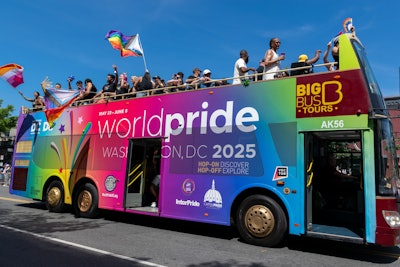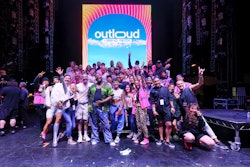
Companies used to be so pervasive at major Pride events that supporters were worried about excessive corporatization, calling it “rainbow capitalism.”
This year, the opposite seems to be happening, with brands being less loud and proud in the face of political pressure and economic uncertainty. According to a survey conducted by Gravity Research, 39% of executives plan to decrease their recognition of Pride this year.
Concern about potential DEI investigations by the federal government is the primary reason brands are pulling back on Pride marketing, followed by potential backlash from conservative activists and consumers, the survey found. And this includes events like citywide parades.
For example, three of last year’s platinum sponsors—Garnier, Mastercard, and Target—pulled their public support of the NYC Pride March, according to The New York Times. Only L’Oreal remains.
To help bridge the financial gap caused by the lack of corporate funding, Heritage of Pride, the nonprofit behind NYC’s official LGBTQIA+ Pride events, has launched a peer-to-peer fundraising campaign to offset the $750,000 shortfall and cover production costs, support queer artists, and keep events free and accessible.
Besides fewer Pride events, a smaller budget also means less money for grant programs and year-round programming outside of Pride Month. “It also puts at risk our ability to hire a private security firm and de-escalation teams,” organizers said in a statement.
Other Pride events have lost key sponsors, including Anheuser-Busch InBev in St. Louis and Diageo in San Francisco. Also, Minneapolis’ Twin Cities Pride organizers rejected monetary support from Target in response to the retailer’s announcement earlier this year that it would roll back its DEI initiatives.
A spokesperson for the Capital Pride Alliance, which organizes Pride celebrations in Washington, D.C., as well as hosting this year’s WorldPride, said that former sponsors including Comcast/Xfinity, Booz Allen Hamilton, Mastercard, Deloitte, Visa, and Amtrak are not participating in this year’s festivities, while other companies are providing sponsorship dollars but are acting as silent partners without recognition.
They said the companies cited budget and safety as their primary concerns for their lack of participation, “which may or may not be true. Being in D.C., we see a lot of support from federal contractors, and many companies are scared of being audited or sued by the federal government. Some have admitted that, while others have told us they really wish they could participate and want to revisit this in a year or so.”
Marriott, Hilton, Wegmans, Giant Food, VIDA Fitness, the Human Rights Campaign, and others are still on board. “The Mayor’s Office of LGBTQ+ Affairs, Destination DC, and Events DC have been tremendously supportive and vocal about the success of WorldPride and that plays a huge role,” the spokesperson said. WorldPride DC 2025 kicked off May 17 and runs through June 8. The global celebration features parades, festivals, marches, exhibits, and cultural programming.
Of course, some brands like Grindr remain dedicated to the cause year-round. Once again, the app will hit the road with Grindr Rides, a big yellow bus that’s stopping in cities including New York, London, Berlin, and Paris.
The mobile activations, which kick off in the U.S. in Washington, D.C., on June 6, will feature profile photo shoots, local artist takeovers, interactive games, drag hosts, merch giveaways, and a rooftop setup. The app is also expanding its digital footprint with a content series that covers topics such as travel, sexual health, and queer history.
“With nearly 40% of brands scaling back Pride engagement this year, we’re choosing to lean in,” explained Tristan Pineiro, Grindr's senior vice president of brand marketing and communications. “Our very existence is a political statement, and this tour is our love letter to the people and places that built queer culture.”
When asked about the rollback of DEI initiatives by some companies, Pineiro said that it actually offers clarity. “It separates the brands that showed up for optics from those that showed up with intention. And that distinction matters,” he said.
The ongoing attacks on LGBTQ+ rights, particularly those of trans people, along with the loss of corporate and government support, "has and will continually remind the community of its strength,” said Graham Nolan, co-chair of storytelling and partnership at Do the WeRQ, an organization that aims to increase queer creativity and representation in the marketing industry.
“It’s not like big business and the government ushered us to a place of progress and then suddenly abandoned us. LGBTQ+ communities imagined a better life for themselves, communicated their expectations and hopes to audiences, architected structures for community connection and equity, then co-created a better world with increased value and equity,” he said about the movement's evolution.
Pineiro added, “The companies that have stayed committed even when it wasn’t trendy or easy are building real, lasting loyalty. The ones pulling back? They’re learning the hard way that marginalized communities can smell performative allyship a mile away.”
This also applies to brands that only offer support during the month of June.
“Authentic support for the LGBTQ+ community begins with action, not optics. In today’s climate, especially for trans individuals, allyship is not a seasonal gesture but a year-round responsibility. Brands have a powerful role to play, and the most meaningful impact comes from partnering with organizations, like The Stonewall Inn Gives Back Initiative, doing the grassroots work every day," said Stacy Lentz, co-owner of The Stonewall Inn in NYC (the site of the 1969 riots that launched the gay rights movement) and CEO of The Stonewall Inn Gives Back Initiative (SIGBI), a nonprofit committed to eliminating the social intolerance that impacts LGBTQ+ individuals. "Brands shouldn’t wait for the cultural tide to turn before taking a stand. This is a time for courage, not caution.”
Kate Wolff, co-chair of programming and operations for Do the WeRQ and CEO of Lupine Creative, echoed that sentiment, saying, “Authentic support for the LGBTQ+ community doesn’t start and end with Pride Month; it’s a year-round commitment that must be rooted in intention, action, and infrastructure. While public visibility matters, especially during times when the community faces heightened political and cultural backlash, the most meaningful support often happens behind the scenes—within the walls of a company."
Part of those efforts should be to work with LGBTQ+ creators, vendors, and agencies year-round. “When brands invest in ongoing, embedded partnerships, they help build infrastructure that sustains queer work and talent far beyond the visibility cycle of Pride,” Wolff said. “That also leads to more informed, nuanced creative work that resonates.”
Going forward, Graham suggests that brands “take this relatively quiet year to regroup and focus on strategy. I think for far too long, we’ve focused on creative outputs (‘Is there an overtly queer person in the campaign?’) and not enough on the strategy that informs the entire brand experience process.”
He said that includes upgrading consumer segmentation and defining demos the way the community defines themselves, such as trans or bisexual, not simply LGBTQ+. Graham also said that brands need to be ready to receive hate. “If the backlash is outside your target audience, it shouldn’t matter. You can’t please everyone.”
And don’t back down. He said that brands need to ask themselves, "‘If the internet hates this and complains, will we backtrack?’ If the answer is ‘yeah, we probably will backtrack,’ then you’re not activating the right idea. Do what you say you’ll do; that’s integrity.”
“In 2025, the LGBTQ+ community is facing an alarming wave of discrimination, DEI rollbacks, and anti-LGBTQ+ legislation that's affecting our ability to live safely and authentically. That’s why supporting the LGBTQ+ community isn’t a seasonal statement, it’s an urgent, ongoing responsibility. In today’s climate, real allyship means creating tangible protections, uplifting queer voices, and ensuring that spaces remain safe and inclusive," Lentz said.
The SIGBI's Safe Spaces certification program works with brands, companies, and venues to ensure they have the training, policies, and standards in place to create truly inclusive environments for LGBTQ+ employees and customers. Partners include JetBlue, Brooklyn Brewery, Jägermeister, AEG’s Crypto.com Arena, and the Peacock Theater.
This year, in collaboration with The Stonewall Inn, Jägermeister is launching the SafeNow app in the U.S.; it enables patrons to discreetly alert bar security or management if they feel unwell or threatened. Using precise indoor location technology, SafeNow pinpoints the user’s location inside the venue to ensure a rapid response when help is needed.
"Brands have power, influence, and platforms, and how they choose to use them can save lives," Lentz added.



















